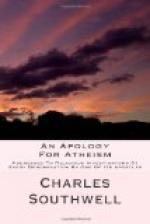Theologians ask, who created Nature? without adducing satisfactory evidence that Nature was created, and without reflecting that if it is difficult to believe Nature self-existent, it is much more difficult to believe some self-existent Super-nature, capable of producing it. In their anxiety to get rid of a natural difficulty, they invent a supernatural one, and accuse Atheists of ‘wilful blindness,’ and ‘obstinate deafness,’ for not choosing so unphilosophic a mode of explaining universal mystery. Call upon them to define their ‘all-creative Deity,’ and they know not what to answer. Ask them who, what, or where He is, and at once you have them on the hip; at once you spy their utter ignorance, and reduce them to a condition very similar to that of Master Abraham Slender, when with stammering lips he ’sings small like a woman.’ To assume everything they are always ready; but to prove anything concerning their Immense Supernatural, they are never prepared. Regularly drilled to argue in a circle, they foolishly imagine everybody else should do the same, and marvel at the man who rigidly adheres to just rules of philosophising and considers experience of natural derivation a far safer guide than their crude, undigested, extravagant, contradictory notions about the confessedly unknown.
The rule of philosophising just adverted to—that rule which forbids us, in any case, to choose the greater of two difficulties—is of immense importance, and should be carefully considered by every one anxious to arrive at correct conclusions with respect to theology. For if believers in God do depart from that rule—if their belief necessarily involve its violation—to persist in such belief is to persist in what is clearly opposed to pure reason. Now, it has been demonstrated, so far as words can demonstrate any truth whatever, that the difficulty of him who believes Nature never had an author, is infinitely less than the difficulty of him who believes it had a cause itself uncaused. In the ‘Elements of Materialism,’ an unequal but still admirable work by Dr. Knowlton, a well-known American writer, this question of comparative difficulty is well handled, and the Author of this Apology conceives most satisfactorily exhausted.
‘The sentiment,’ says the Doctor,’ that a being exists which never commenced existence, or what is the same thing, that a being exists which has existed from all eternity, appears to us to favour Atheism, for if one being exist which never commenced existence—why not another—why not the universe? It weighs nothing, says the Atheist, in the eye of reason, to say the universe appears to man as though it were organised by an Almighty Designer; for the maker of a thing must be superior to the thing made; and if there be a maker of the universe there can be no doubt, but that if such maker were minutely examined by man, man would discover such indications of wisdom and design that it would be more difficult for him to admit that such maker was




